Top 8 Benefits of Multichannel Selling for Your Business
Top 8 Benefits of Multichannel Selling for Your Business
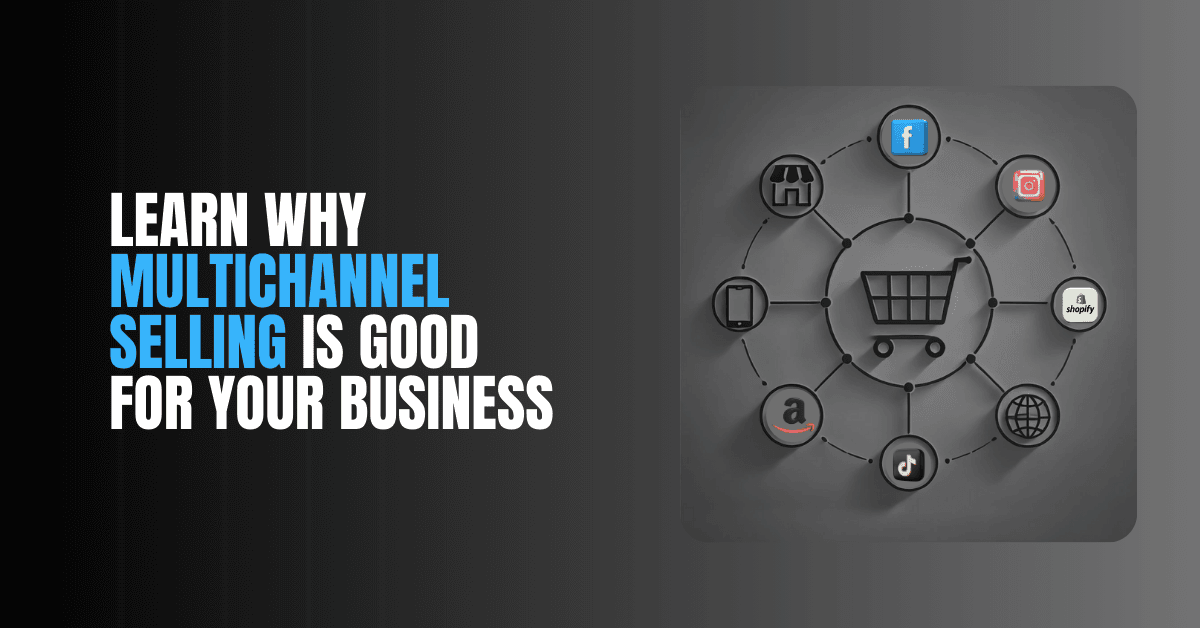


Oct 16, 2024
Oct 16, 2024
In today's competitive digital landscape, businesses can no longer rely on a single sales channel to achieve growth. The era of sticking to just one platform is long gone, and using various channels such as online marketplaces, social media, and physical stores has become essential.
What is Multichannel Selling?
This approach caters to the modern consumer, who seamlessly navigates between shopping touchpoints, including websites, social media, and traditional brick-and-mortar stores.
Multichannel selling empowers businesses to enhance customer journeys, reach broader audiences, and increase sales.
Explore the eight key benefits of multichannel selling strategy for modern businesses:
1. Expanded Reach and Sales Opportunities
By listing your products on online marketplaces like Amazon, engaging with customers on social media, and maintaining an eCommerce website, you can connect with millions of potential customers who may not otherwise find your business.
For example, a report from Jungle Scout indicates that 56% of online shoppers start their product searches on Amazon, it shows the importance of such platforms to capture customer interest and drive sales growth.
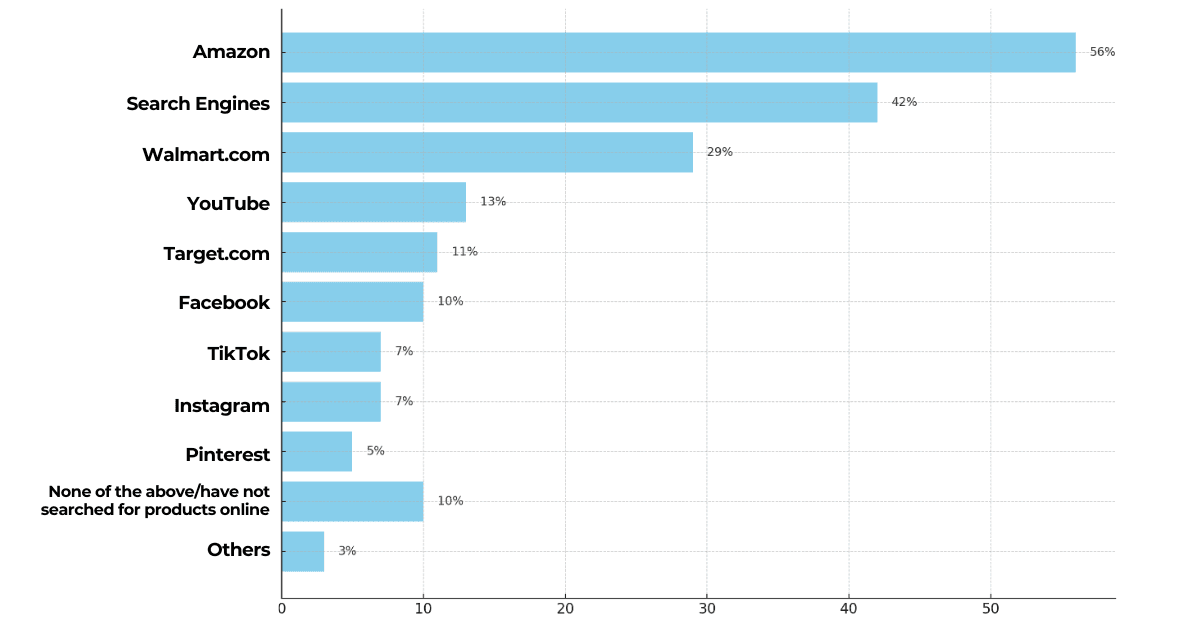
2. Enhanced Customer Engagement and Experience
According to Salesforce's "State of the Connected Customer" report, 76% of consumers expect consistent interactions across departments, with 70% saying connected processes are very important to winning their business.
The map below shows the flow between channels and how they contribute to the overall customer experience.
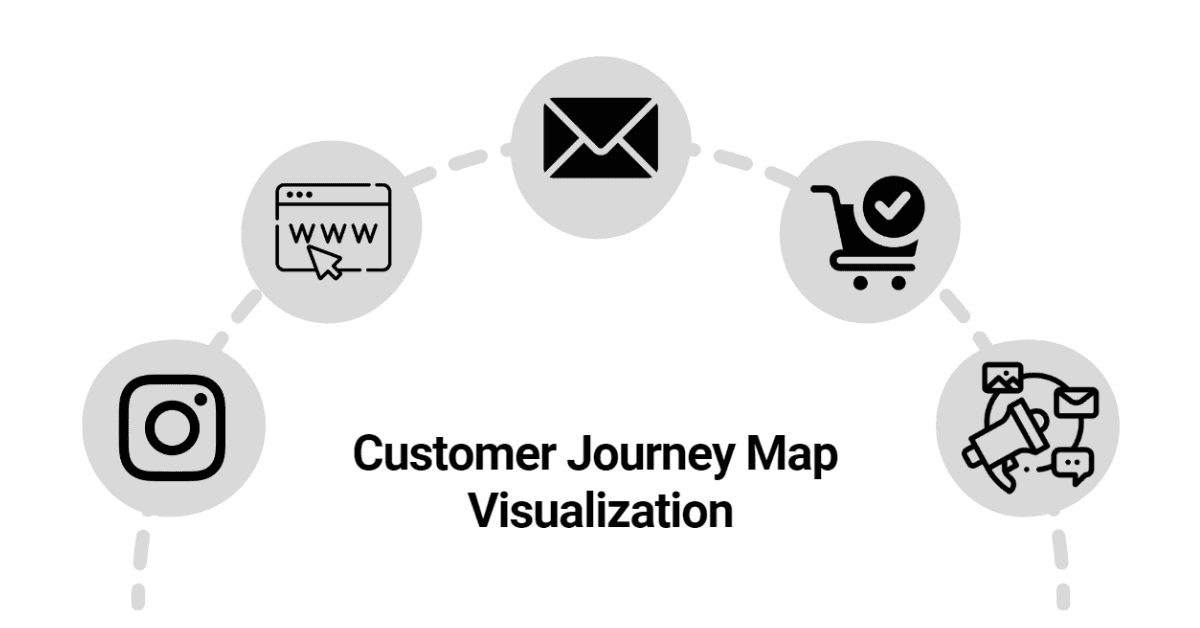
When customers find consistent branding, messaging, and customer service across channels, it fosters trust in your business. This consistency encourages repeat purchases, leading to improved customer retention and loyalty.
3. Risk Reduction and Business Flexibility
When eBay experienced a major outage in 2014, businesses that sold exclusively on that platform faced significant losses, read more about it from PowerRetail. In contrast, those with multichannel strategies were able to offset the impact through sales on other platforms.
Relying solely on a single sales channel exposes businesses to significant risks, such as changes in platform policies, algorithm updates, or outages.
4. Cost Efficiency and Budget Optimization
Managing costs effectively is crucial for business success, and multichannel selling allows for better cost management by comparing expenses across different platforms.
Businesses can analyze which channels deliver the highest return on investment (ROI) and allocate their budgets more efficiently.
Additionally, using technology such as inventory management systems (QuickSync) and marketing automation tools can help reduce operational costs. According to QuickBooks, these tools streamline tasks like stock tracking, order processing, and customer communication, resulting in significant cost savings.
5. Better Data Insights
Selling across multiple channels generates valuable data on customer preferences and behaviors. This data can be used to identify which products perform well, understand customer demographics, and track the effectiveness of marketing strategies.
Tools such as Google Analytics, SEMrush, and Hotjar can help track customer behavior and sales performance across various channels.
6. Strengthened Brand Presence and Recognition
Being active on various platforms increases your brand's visibility and helps build a stronger presence. According to a study by Forbes, brands that consistently engage with their audience across multiple platforms see a significant boost in overall customer recall. Check out the top companies with killer digital marketing campaigns.
This consistent brand exposure enhances recognition and credibility, leading to increased customer confidence in your products or services.
7. Faster Adaptation to Consumer Trends
The retail landscape is constantly changing, and businesses must stay attuned to shifts in consumer behavior. Multichannel selling allows businesses to quickly respond to emerging trends, market shifts, and seasonal demands, ensuring they remain agile in a fast-paced environment.
The data from Shopify below shows the top strategies businesses are using to adapt to consumer trends, aligning with the multichannel selling approach discussed. Here is Qualtrics talking about 2025's consumer trends already!
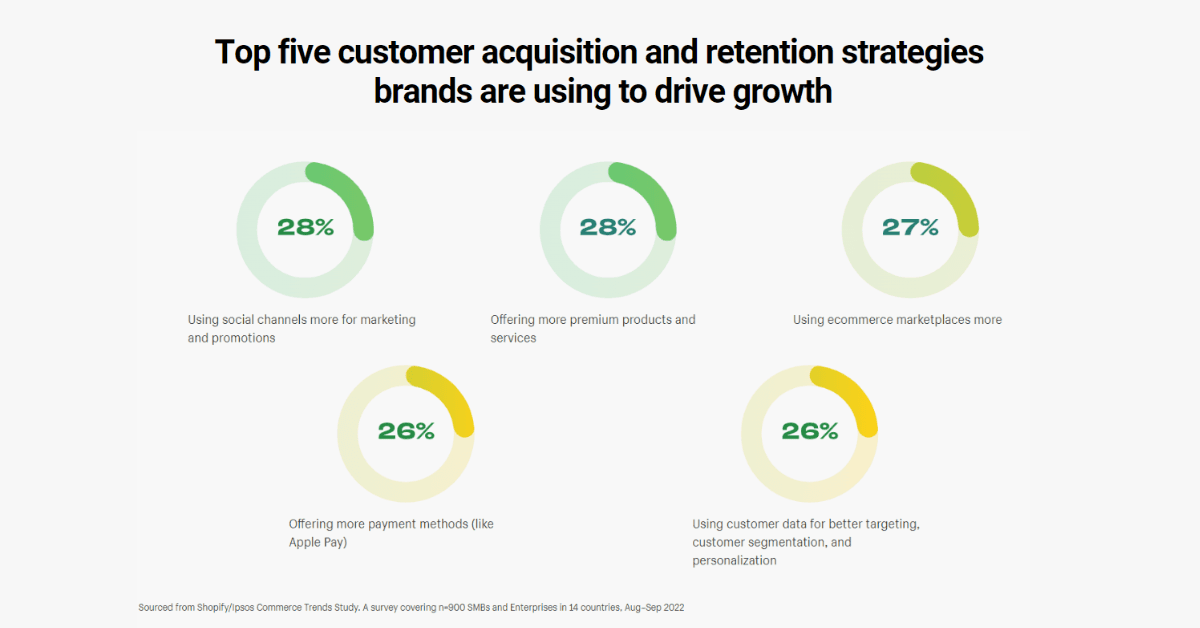
8. Enhanced Cross-Channel Promotional Opportunities
Cross-promotion across multiple channels can significantly increase brand exposure and sales.
Imagine a business promoting an exclusive social media offer (like a 15% discount) that is only redeemable on their eCommerce site. Take a look at the example below:
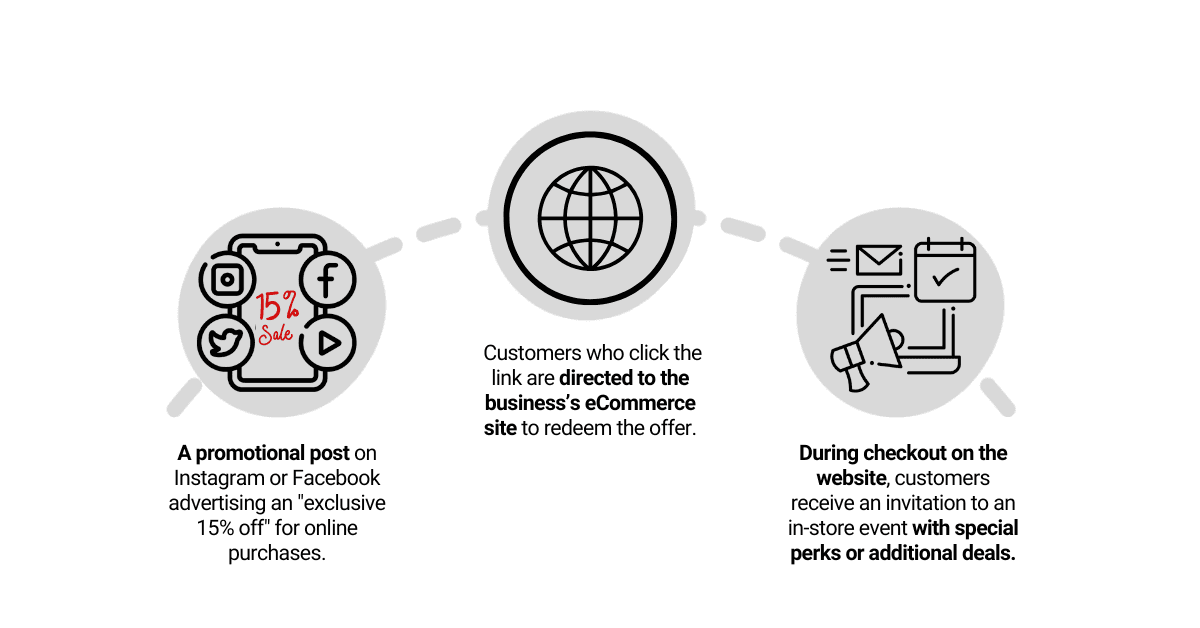
Effective cross-channel promotions encourage customers to interact with your brand in different ways, increasing the likelihood of purchases across various platforms. See the 10 best Cross-Channel Marketing Platforms from Improvado.
Common Multichannel Selling Platforms
To make the most of multichannel selling, it’s essential to understand the various platforms available:
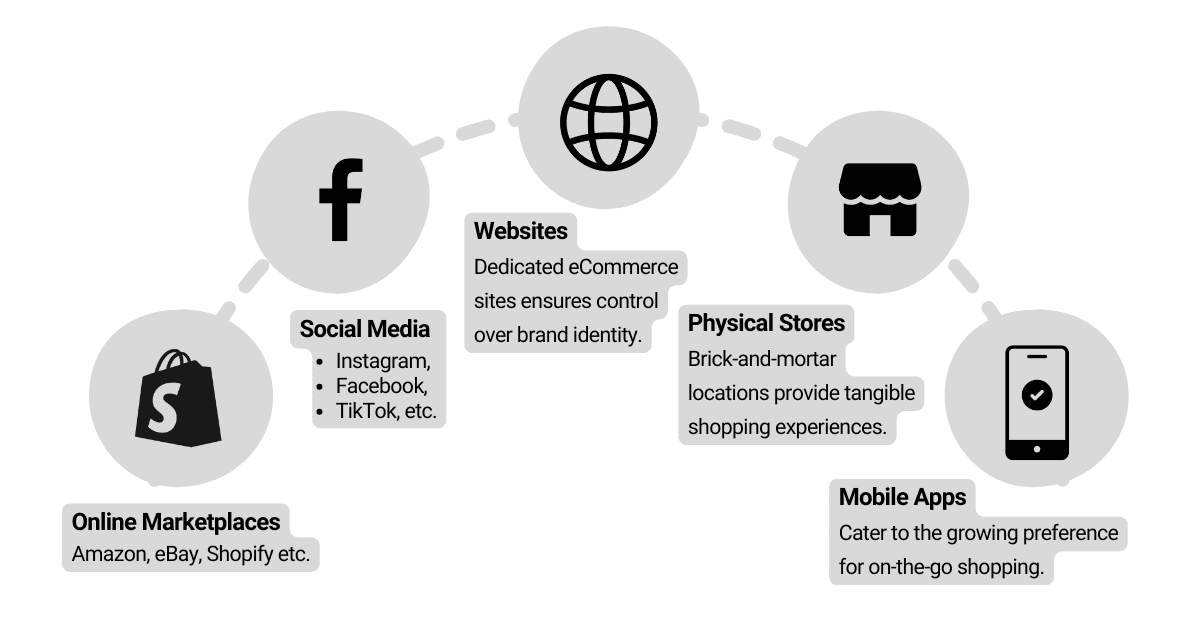
How to Implement Multichannel Selling Successfully
Implementing a multichannel strategy involves several steps:
Identify Target Channels: Choose platforms based on your audience's shopping habits.
Evaluate Resources: Ensure you have the budget, personnel, and technology needed.
Choose Integration Tools: Use platforms like QuickSync for centralized management.
Create Consistent Content: Maintain uniform branding and messaging across channels.
Monitor Performance: Use analytics tools to track sales, customer engagement, and ROI.
In today's competitive digital landscape, businesses can no longer rely on a single sales channel to achieve growth. The era of sticking to just one platform is long gone, and using various channels such as online marketplaces, social media, and physical stores has become essential.
What is Multichannel Selling?
This approach caters to the modern consumer, who seamlessly navigates between shopping touchpoints, including websites, social media, and traditional brick-and-mortar stores.
Multichannel selling empowers businesses to enhance customer journeys, reach broader audiences, and increase sales.
Explore the eight key benefits of multichannel selling strategy for modern businesses:
1. Expanded Reach and Sales Opportunities
By listing your products on online marketplaces like Amazon, engaging with customers on social media, and maintaining an eCommerce website, you can connect with millions of potential customers who may not otherwise find your business.
For example, a report from Jungle Scout indicates that 56% of online shoppers start their product searches on Amazon, it shows the importance of such platforms to capture customer interest and drive sales growth.

2. Enhanced Customer Engagement and Experience
According to Salesforce's "State of the Connected Customer" report, 76% of consumers expect consistent interactions across departments, with 70% saying connected processes are very important to winning their business.
The map below shows the flow between channels and how they contribute to the overall customer experience.

When customers find consistent branding, messaging, and customer service across channels, it fosters trust in your business. This consistency encourages repeat purchases, leading to improved customer retention and loyalty.
3. Risk Reduction and Business Flexibility
When eBay experienced a major outage in 2014, businesses that sold exclusively on that platform faced significant losses, read more about it from PowerRetail. In contrast, those with multichannel strategies were able to offset the impact through sales on other platforms.
Relying solely on a single sales channel exposes businesses to significant risks, such as changes in platform policies, algorithm updates, or outages.
4. Cost Efficiency and Budget Optimization
Managing costs effectively is crucial for business success, and multichannel selling allows for better cost management by comparing expenses across different platforms.
Businesses can analyze which channels deliver the highest return on investment (ROI) and allocate their budgets more efficiently.
Additionally, using technology such as inventory management systems (QuickSync) and marketing automation tools can help reduce operational costs. According to QuickBooks, these tools streamline tasks like stock tracking, order processing, and customer communication, resulting in significant cost savings.
5. Better Data Insights
Selling across multiple channels generates valuable data on customer preferences and behaviors. This data can be used to identify which products perform well, understand customer demographics, and track the effectiveness of marketing strategies.
Tools such as Google Analytics, SEMrush, and Hotjar can help track customer behavior and sales performance across various channels.
6. Strengthened Brand Presence and Recognition
Being active on various platforms increases your brand's visibility and helps build a stronger presence. According to a study by Forbes, brands that consistently engage with their audience across multiple platforms see a significant boost in overall customer recall. Check out the top companies with killer digital marketing campaigns.
This consistent brand exposure enhances recognition and credibility, leading to increased customer confidence in your products or services.
7. Faster Adaptation to Consumer Trends
The retail landscape is constantly changing, and businesses must stay attuned to shifts in consumer behavior. Multichannel selling allows businesses to quickly respond to emerging trends, market shifts, and seasonal demands, ensuring they remain agile in a fast-paced environment.
The data from Shopify below shows the top strategies businesses are using to adapt to consumer trends, aligning with the multichannel selling approach discussed. Here is Qualtrics talking about 2025's consumer trends already!

8. Enhanced Cross-Channel Promotional Opportunities
Cross-promotion across multiple channels can significantly increase brand exposure and sales.
Imagine a business promoting an exclusive social media offer (like a 15% discount) that is only redeemable on their eCommerce site. Take a look at the example below:

Effective cross-channel promotions encourage customers to interact with your brand in different ways, increasing the likelihood of purchases across various platforms. See the 10 best Cross-Channel Marketing Platforms from Improvado.
Common Multichannel Selling Platforms
To make the most of multichannel selling, it’s essential to understand the various platforms available:

How to Implement Multichannel Selling Successfully
Implementing a multichannel strategy involves several steps:
Identify Target Channels: Choose platforms based on your audience's shopping habits.
Evaluate Resources: Ensure you have the budget, personnel, and technology needed.
Choose Integration Tools: Use platforms like QuickSync for centralized management.
Create Consistent Content: Maintain uniform branding and messaging across channels.
Monitor Performance: Use analytics tools to track sales, customer engagement, and ROI.
© 2024 The Quick Company
© 2024 The Quick Company
© 2024 The Quick Company

